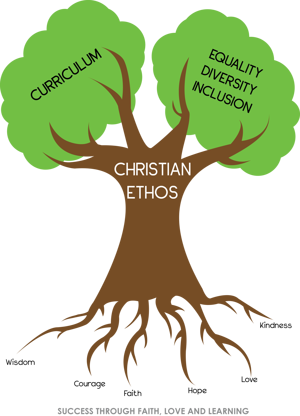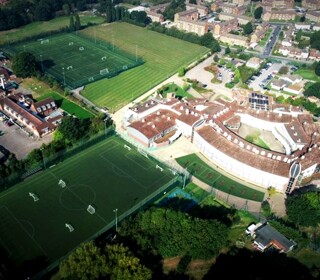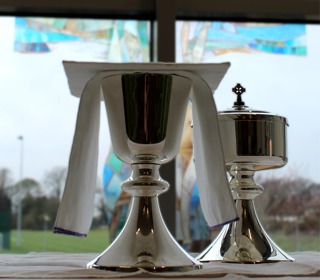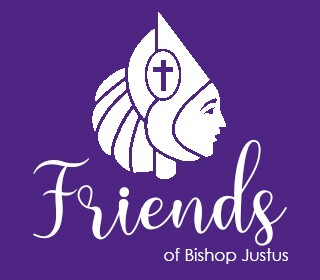- Home
- Our Vision and Ethos
- Vision and Ethos Statement
Vision and Ethos Statement
Vision
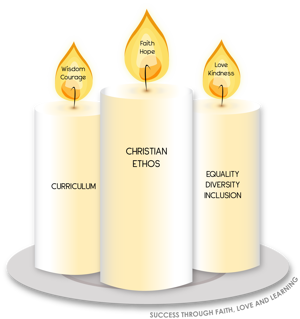 At Bishop Justus we seek to educate the whole person, so that each child will be able to live life ‘to the full’ (John 10:10). Inspired by the good shepherd in John 10, we want each child and member of staff (our flock) to flourish and realise their potential. For our children, this is enabled by an excellent education, delivered via a broad and balanced curriculum, with a rich variety of experiences that extend beyond the classroom. We want our students to succeed, in the widest possible sense, using their God given talents fully as children of God. Together as a worshipping community, we turn to the example Christ, the good shepherd, gives us for living life ‘to the full’ (John 10:10, NIV) and to the biblical accounts of others who met challenges and overcame them through faith. We are a diverse school community and the biblical stories of many speak to us, so we offer opportunities to find biblical leaders who speak to us. Through working together, as our motto says, we aim for ‘Success through Faith, Love and Learning.’
At Bishop Justus we seek to educate the whole person, so that each child will be able to live life ‘to the full’ (John 10:10). Inspired by the good shepherd in John 10, we want each child and member of staff (our flock) to flourish and realise their potential. For our children, this is enabled by an excellent education, delivered via a broad and balanced curriculum, with a rich variety of experiences that extend beyond the classroom. We want our students to succeed, in the widest possible sense, using their God given talents fully as children of God. Together as a worshipping community, we turn to the example Christ, the good shepherd, gives us for living life ‘to the full’ (John 10:10, NIV) and to the biblical accounts of others who met challenges and overcame them through faith. We are a diverse school community and the biblical stories of many speak to us, so we offer opportunities to find biblical leaders who speak to us. Through working together, as our motto says, we aim for ‘Success through Faith, Love and Learning.’
Ethos
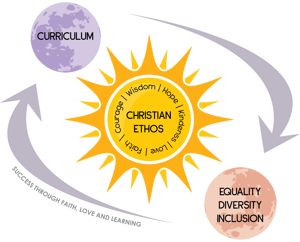 We want our students to have a strong character and be aspirational. The virtues we hope to nurture in our students are many, but in particular these: faith, hope, love, wisdom, courage and kindness. Of all our virtues we emphasise the virtue of love, a love that is perfectly exemplified through the words and actions of Jesus Christ. We want to develop our students to be hard-working and thoughtful individuals who care for themselves and others. Rigorous academic skills and a strong work ethic need to go hand in hand with compassion and empathy in the character of a Bishop Justus student. We base our virtues on Christian teachings rooted in the Bible and in particular, the parable of the Good Shepherd in John 10. These virtues are shared human virtues that can be embraced by all, whether religious or not. Students will develop and strengthen their character through their journey together at Bishop Justus, so that when they leave, they do so as young adults equipped with Christian virtues that will support them for life. They will have received an education that has nurtured them into becoming well-rounded individuals that have strong characters that enable them to live ‘life in all its fullness.’
We want our students to have a strong character and be aspirational. The virtues we hope to nurture in our students are many, but in particular these: faith, hope, love, wisdom, courage and kindness. Of all our virtues we emphasise the virtue of love, a love that is perfectly exemplified through the words and actions of Jesus Christ. We want to develop our students to be hard-working and thoughtful individuals who care for themselves and others. Rigorous academic skills and a strong work ethic need to go hand in hand with compassion and empathy in the character of a Bishop Justus student. We base our virtues on Christian teachings rooted in the Bible and in particular, the parable of the Good Shepherd in John 10. These virtues are shared human virtues that can be embraced by all, whether religious or not. Students will develop and strengthen their character through their journey together at Bishop Justus, so that when they leave, they do so as young adults equipped with Christian virtues that will support them for life. They will have received an education that has nurtured them into becoming well-rounded individuals that have strong characters that enable them to live ‘life in all its fullness.’
School Virtues
The parable of the Good Shepherd exemplifies our six Bishop Justus Christian virtues.
 “I am the good shepherd. The good shepherd lays down his life for the sheep” (John 10:11, NIV). God sending His Son Jesus to earth to die for us is the greatest act of love. Through love we aim to support our community in times of both challenge and joy. We have high expectations of every member of our community regarding how we work together. Living out our pillar of equality, diversity and inclusion, we believe there are no outsiders in our community; everyone has value and brings their individual uniqueness. Therefore, we respect each other as loved children of God and understand all are equal before God.
“I am the good shepherd. The good shepherd lays down his life for the sheep” (John 10:11, NIV). God sending His Son Jesus to earth to die for us is the greatest act of love. Through love we aim to support our community in times of both challenge and joy. We have high expectations of every member of our community regarding how we work together. Living out our pillar of equality, diversity and inclusion, we believe there are no outsiders in our community; everyone has value and brings their individual uniqueness. Therefore, we respect each other as loved children of God and understand all are equal before God.
 Kindness: ‘… there shall be one flock and one shepherd’ (John 10:16). The pastoral care of the good shepherd inspires our sense of community (flock); all working together and looking out for each other, putting others first and celebrating successes. Through kindness we put others first in our thoughts, words and our actions. When at times we disagree, we will disagree well, learning to accept and live with different points of view. We actively extend kindness to our wider community through our faith in action work, taking responsibility not just for our own wellbeing, but also that of others.
Kindness: ‘… there shall be one flock and one shepherd’ (John 10:16). The pastoral care of the good shepherd inspires our sense of community (flock); all working together and looking out for each other, putting others first and celebrating successes. Through kindness we put others first in our thoughts, words and our actions. When at times we disagree, we will disagree well, learning to accept and live with different points of view. We actively extend kindness to our wider community through our faith in action work, taking responsibility not just for our own wellbeing, but also that of others.
 Faith: “I am the good shepherd; I know my sheep and my sheep know me” (John 10:14). We have faith in Jesus the good shepherd, following Jesus’ example of caring and respectful leadership. Knowing Jesus, knowing each other and knowing ourselves, means we can trust each other and have faith in our community and faith in ourselves.
Faith: “I am the good shepherd; I know my sheep and my sheep know me” (John 10:14). We have faith in Jesus the good shepherd, following Jesus’ example of caring and respectful leadership. Knowing Jesus, knowing each other and knowing ourselves, means we can trust each other and have faith in our community and faith in ourselves.
 Hope: ‘… he goes on ahead of them, and his sheep follow him because they know his voice.’ (John 10:4). The good shepherd works in the present, whilst looking with hope to the future. The coming of Jesus is what gives us hope, irrespective of challenges we may face. Hope is not portrayed in our worship and learning conversations as a vague wish, rather it is seen as having a positive attitude towards the future. We promote a message of hope, that through their time at Bishop Justus our students can learn what it means to live life ‘to the full’.
Hope: ‘… he goes on ahead of them, and his sheep follow him because they know his voice.’ (John 10:4). The good shepherd works in the present, whilst looking with hope to the future. The coming of Jesus is what gives us hope, irrespective of challenges we may face. Hope is not portrayed in our worship and learning conversations as a vague wish, rather it is seen as having a positive attitude towards the future. We promote a message of hope, that through their time at Bishop Justus our students can learn what it means to live life ‘to the full’.
 Courage: ‘The one who enters by the gate is the shepherd of the sheep. The gatekeeper opens the gate for him’ (John 10:2-3, NIV). Jesus is the gate which leads to salvation. Through courage we strive to show others how to work in our community so we may follow the right way, even if that way is difficult. We show others the standards we expect. Our student-led equality, diversity and inclusion work means that both students and staff have the courage to challenge themselves as well as others in the pursuit of justice; an example being that we are an actively anti-racist community.
Courage: ‘The one who enters by the gate is the shepherd of the sheep. The gatekeeper opens the gate for him’ (John 10:2-3, NIV). Jesus is the gate which leads to salvation. Through courage we strive to show others how to work in our community so we may follow the right way, even if that way is difficult. We show others the standards we expect. Our student-led equality, diversity and inclusion work means that both students and staff have the courage to challenge themselves as well as others in the pursuit of justice; an example being that we are an actively anti-racist community.
 Wisdom: “This command I received from my Father.” (John 10:18). Sheep hear the voice of the shepherd, do not follow strangers and move in the correct direction. Through wisdom we not only learn, but also understand that positive behaviour leads to the best outcomes for all; a life lived ‘to the full.’ The Bible is passionate about both wisdom-seeking and the importance of teaching and learning. Wisdom has at its base knowledge, but also moves above analysis and evaluation and beyond what examinations can assess.
Wisdom: “This command I received from my Father.” (John 10:18). Sheep hear the voice of the shepherd, do not follow strangers and move in the correct direction. Through wisdom we not only learn, but also understand that positive behaviour leads to the best outcomes for all; a life lived ‘to the full.’ The Bible is passionate about both wisdom-seeking and the importance of teaching and learning. Wisdom has at its base knowledge, but also moves above analysis and evaluation and beyond what examinations can assess.






